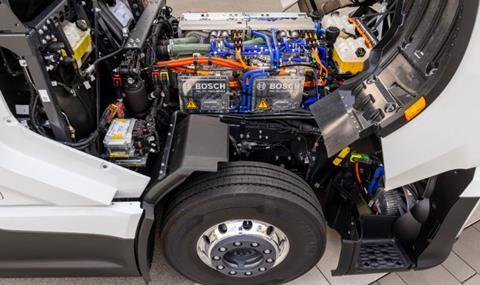
Bosch has placed a €2.5bn (£2.14bn) bet on green hydrogen playing a major role in decarbonising transport, industry and buildings.
The company has kicked off production of its fuel cell power module at its Stuttgart plant in a move which sees US manufacturer Nikola Corporation serving as its pilot customer with its Class 8 hydrogen fuel cell electric truck, scheduled to enter the US market later this year.
Bosch is also aiming to launch a hydrogen engine suitable for long haul HGVs next year, with the company revealing it already has four orders for production projects from “all the major economic regions”, adding that it expects six-figure unit volumes by 2030.
Bosch, which operates along the entire hydrogen value chain, aims to generate hydrogen technology sales of around €5bn by 2030, by which time, the company predicts that worldwide one in five new trucks weighing six tonnes or more will feature a fuel-cell powertrain.
Announcing Bosch’s plans for production of its fuel cell, Bosch chairman Dr Stefan Hartung, said: “Here in Stuttgart-Feuerbach, in the plant whose history goes back further than any other Bosch plant, the hydrogen future is about to happen. Bosch knows its way around hydrogen, and Bosch is growing with hydrogen.”
Bosch said it will use a global manufacturing network as well as its German locations, using the Bosch plant in Bamberg, Germany to supply the fuel cell stack to the Feuerbach plant in Stuttgart, where production is taking place, and the Bosch plant in Homburg, to supply components such as the electric air compressor and the recirculation blower.
Markus Heyn, chairman of Bosch Mobility said: “Bosch is one of the very few companies that are capable of mass producing technology as complex as fuel-cell stacks. We don’t just have the required systems expertise, but also the capability of quickly scaling up new developments to mass production.
Read more
- Energy giant SSE to trial hydrogen-fuelled van from First Hydrogen
- Nikola CEO slams truck manufacturers for avoiding switch to alternative fuels
- Element 2 partners with fuel card provider Radius to develop hydrogen refuelling network
Production of the fuel-cell power module is also starting in Chongqing, China, with the required components coming from the Wuxi plant. “Bosch is the first company to produce these systems in both China and Germany,” Hartung added.
The company is also planning to manufacture stacks for mobile applications in its US plant in Anderson, South Carolina.
Bosch is also calling on policymakers to recognise that net zero can only be achieved via a hydrogen economy. In a statement the company said: “For Bosch, that is crystal-clear. The company therefore strongly advocates the establishment of a hydrogen economy, and is stepping up its investments in hydrogen.”
Between 2021 and 2026, Bosch will have invested a total of nearly €2.5bn in the development and manufacturing of its H2 technologies - another billion euros more than was earmarked in the investment plan for 2021 to 2024.
The company added that hydrogen offers huge business opportunities and thousands of jobs, pointing out that there are more than 3,000 people at Bosch working on hydrogen technologies, more than half of them in Europe.
However Hartung said Europe must do much more to create a counterweight to the rapid pace of developments in other regions of the world, such as the US and laid out four demands of German and European policymakers.
He said: “First, we have to step up the pace of hydrogen production in the EU. Second, global supply chains have to be set up, and third, hydrogen has to be used in all sectors of the economy.” As a fourth point he also stressed the importance of quickly setting up infrastructure for distributing hydrogen in Europe














